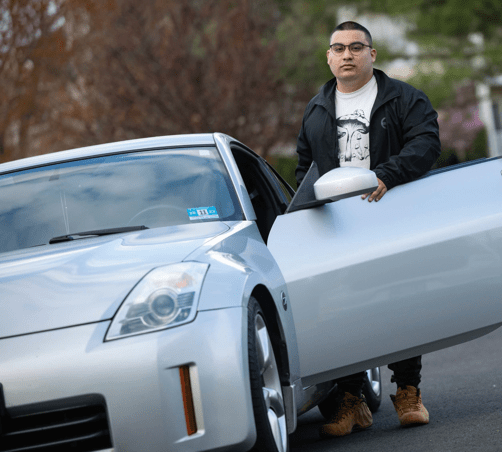"I'm extremely grateful for the nurses, doctors and occupational therapists ... They saved my life."

Nelson Ortega was young and healthy, so he was taken by surprise when he developed a hacking cough early last August. “I wasn’t breathing normally,” the 23-year-old Bridgewater resident recalls. At night, sweats and shakes began wracking his body. “I thought I’d caught COVID,” he says.
When over-the-counter medicines didn’t ease his discomfort after several days, Nelson called his doctor and described his COVID-like symptoms. “The office told me to go straight to the hospital,” he says. He headed for Robert Wood Johnson University Hospital (RWJUH) Somerset—a decision that would save his life.
Fear and Faith
To his surprise, Nelson tested negative for COVID. Instead, he was suffering from pneumonia. His symptoms were so severe that his treatment team decided to sedate and intubate him. The news was frightening, but “I put everything into faith,” he says. “At the hospital, I knew I would be in great hands. I gave my parents a call, saying what they were going to do.” He spent the next three weeks unconscious.
When Nelson awoke, he was in fragile shape. “My lungs were still infected, and I had extreme trouble breathing,” he says. “It was a fight just trying to stay alive.”
Part of his lifesaving care entailed lying on his side to ease his breathing, and he developed a pinched nerve that left his right arm and hand immobile.
“It was scary,” says Nelson, who is right-handed. “Everything was.”
Yet there were signs his paralysis might not be permanent.
“I could move a little bit of my wrist and just a little bit of my fingers,” he says. “An occupational therapist would come see me, and he said he had faith I would get the use of my limb back, because I could move my hand.”
Armed with a positive attitude, Nelson overcame his pneumonia. By early September, after about a month in the hospital, he was discharged. He set his sights on a new objective: to regain the use of his hand and arm. Once again, he looked to RWJUH Somerset for help, enrolling in its outpatient occupational therapy (OT) program.
Reaching for Goals
Maria Elena Halka, OTR, an occupational therapist at RWJUH Somerset, remembers meeting Nelson in September. “He was walking with a cane and didn’t have any movement in his arm,” she says. “He had a little bit of shoulder extension and a bit of thumb movement, but he couldn’t raise his arm or bend his elbow, and he could not use his right hand at all.”
OT is designed to address such problems. “It’s aimed at helping the patient do what they need to do in everyday life,” Halka says.
Nelson, who worked at a car dealership and was frequently behind the wheel, would need as much arm and hand function as he could muster.
Halka and her team assessed Nelson’s abilities and limitations, then customized a therapeutic plan. “We focused on gradually restoring the mobility of the shoulder and elbow, then moving the forearm and wrist using meaningful activities to target the desired function,” Halka says.
“At first, they would have me try to pick up little blocks and put them in a bucket to get my arm to raise,” Nelson recalls of his initial hour-long OT sessions, which he attended three times a week. “Then, when the arm started becoming mobile, they would put weights on it and I would continue trying to raise it up.”
Other activities focused on education about his posture and preventing compensatory motions. “We focused on restoring his function to as normal as possible,” Halka says.
Nelson received homework, too. “I wanted him to involve his hand and arm in everyday activities,” Halka says. “He might have to write using an adaptive pen, help sweep his house or empty the dishwasher, for example.”
Gradually, exercises grew more complex. For instance, “I would lie flat on my back and they would place little beanbags on my chest,” Nelson says. “I would try to grab the beanbags and place them over my head into a bucket. When my arm started getting a lot more strength, they would usually have me do a couple of push-ups.”
Although the exercises changed, the quality of care Nelson experienced was consistently excellent. “I’ve worked with four different therapists, and they are extremely encouraging, just miracle workers,” he says.
Halka likewise praises Nelson’s perseverance. “Sometimes he was like, ‘You want me to do what?’” she laughs. “But then he was like, ‘Oh, OK, I can do this if you think I can.’”
He’s done so much that his arm and hand are almost fully functional again. “We are now working on pinching and gripping,” says Halka, who anticipates Nelson will soon complete his therapy. He was able to return to work in March, confident in his ability to grip a steering wheel.
“I’m extremely grateful for the nurses and doctors who helped me after waking up from my intubation and for the occupational therapists who helped me recover,” Nelson says. “They saved my life, and I’m just so thankful for everybody. They helped me fight back.”
To learn more about Occupational Therapy at Robert Wood Johnson University Hospital Somerset, call 908-685-2945.